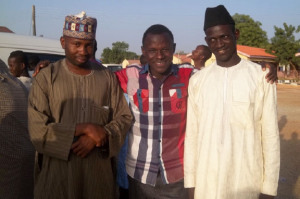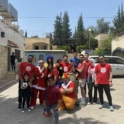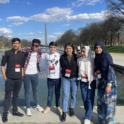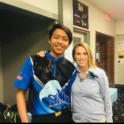West Bank YES alumni organized a GYSD event for orphaned children.
STORIES
Creating Change for Deaf Community in Nigeria

This post comes from a YES alumnus named Ashiru who talks about his experience in Nigeria as a deaf man. Along with some other YES alumni, Ashiru has been able to make significant changes in Nigeria’s deaf community.
By Ashiru Abubakar, YES Nigeria 2011-2012
Just last year I had the opportunity to attend the 22nd Association of Deaf Muslim Unity Nigeria’s annual conference, which was held at Gusau Zamfara State, Nigeria from December 23-31, 2013. I enjoyed volunteering there, especially helping the registrars, as well as running some errands to the president of Nigerian Deaf Muslims, Alhaji Suleiman Dagbo.
The program went very well. More than 21 states attended the event. The total number of delegates that attended was estimated to be around 600, from various states of Nigeria. This was where I got the chance to meet fellow YES alumni, Abdulsalam Abubakar, YES Nigeria 2004-2005, and Garba Mikailu, YES Nigeria 2008-2009.
Abdulsalam, who sat with me for most of the conference, gave me a brief story of his life since his return from the United States. When he returned from the U.S., he found out that the Deaf Association of Sokoto State was in serious chaos. He was asked to lead the association to try and get things in order. He was installed as an interim chairman for the next six months. After six months, Abdulsalam was appointed as the Secretary General for the Sokoto State Association of the Deaf. He has continued to be the Secretary General since first starting in 2006.
By January 2006, he gained employment at Sokoto North Local Government Area, as assistant social welfare worker. He is still working at that Local Government.
After Abdulsalam graduated from senior secondary school, he tried very hard to gain admission to Shehu Shagari College of Education at Sokoto State. However, due to discrimination towards the deaf, he was not allowed to study there. Although frustrated, Abdulsalam did not give up. He stood there, insisting they gave him admission, along with ten other deaf people. He succeeded and studied there from 2005 to 2008, without interpreters. Fortunately today, there are more than 100 deaf people studying at Shehu Shagari College of Education, and the increasing number of deaf people has led to a Department of Special Education opening.
After Abdulsalam graduated from college, he led a petition against the government of Sokoto for the denial of job opportunities due to disabilities. He was successful in his attempt, with the government releasing at least 33 people with disabilities into civil service.
Abdulsalam is currently the acting President of Sokoto State Deaf Muslims.
The other alumnus I met, Garba Mikailu, is currently working in Special Education at the school for the deaf in Gusau Zamfara State, which is where the conference took place. He told me a brief story of his life, explaining that when he returned, he continued with school until he graduated. He graduated in 2010 and during that year he volunteer taught at Special Education Gusau Zamfara State.
Garba was lucky to find someone that hired him to give home lessons to deaf children. That is where he earned his money for transport from home to school. The rest of the money he did not use for transportation he would save, which aided him in paying for college.
While teaching, he applied for another teaching opportunity through Universal Basic Education SUBEB (UBE-SUBEB), with his senior secondary school qualifications, along with some of certifications he had received from the YES program.
After two years, he received a job offer from UBE-SUBEB. At that time, it was very difficult for people with senior secondary school qualifications to get a job. Garba is one of the luckiest people to have been accepted. He started getting paid last year in January. Garba will graduate from Federal College of Technical Gusau Zamfara State this year.
On the last day of the conference was when we took some pictures together. Each of us said, “We indeed are lucky. If it were not for YES, we would never have been able to have those great experiences in our lives. [The] YES program gave us the reason to do those things, and there are more we are looking forward to do…” Conclusively, we are grateful for the YES program. We will continue sending you our good news.
Original story published in IRIS blog





